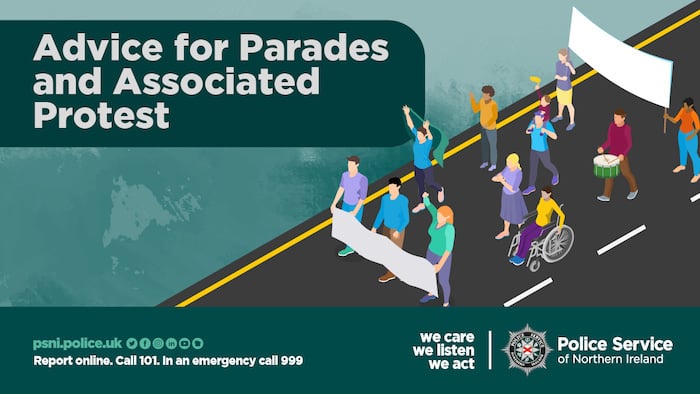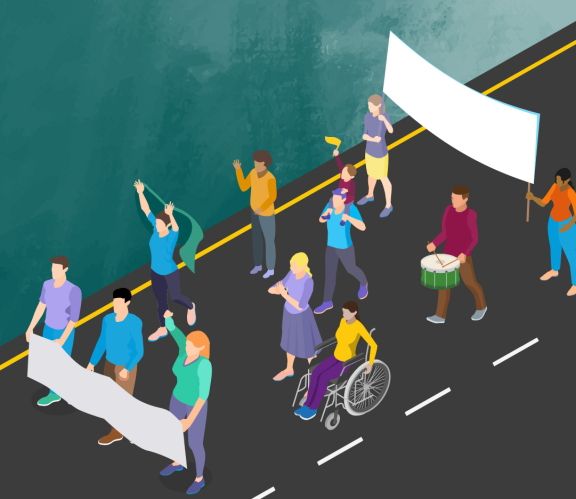Police Advice On Public Processions

The right to participate in a public procession is a fundamental human right. However, this right is limited by the need to uphold the rights of others, protect public health and safety, minimise disruption to normal life and by the need to prevent and detect crime.
The role of the police is to facilitate parades and the exercise of freedom of expression, while ensuring the rights of all persons are protected. This requires us to facilitate lawful protests against public procession. We will seek to uphold the rights of all without discrimination.
WHAT SHOULD YOU DO?
If you are organising a public procession:
- You must notify the Parades Commission. This notification must be given not less than 28 days before the date on which the parade is to be held. More details and online notification can be found at www.paradescommission.org
- If requested, we would ask that you engage with the police.
- You must comply with your obligations under the Public Processions (NI) Act 1998 and the Parades Commission code of conduct.
If you are participating in a public procession:
- If requested, we would ask that you engage with the police.
- You must not endanger the safety of yourself, participants in the public procession or anybody else.
- You must not consume alcohol during the public procession, while travelling to it, or while assembled before taking part in a public procession.
- You should not block the roadway or footpath.
- You should respect the rights of others.
- You should follow instructions provided by police.
If you are organising a protest against a public procession:
- You must notify the parades commission. This notification must be given not less than 14 days before the date on which the parade is to be held. More details and online notification can be found at www.paradescommission.org
- If requested, we would ask that you engage with the police
- You must comply with your obligations under the Public Processions (NI) Act 1998 and the Parades Commission code of conduct.
If you are participating in a protest against a public procession:
- If requested, we would ask that you engage with the police.
- You must not endanger the safety of yourself, participants in the public procession or anybody else.
- You must not consume alcohol in the vicinity of the public procession.
- You should not block the roadway or footpath.
- You should respect the rights of others.
- You should follow instructions provided by police.
Guidance for stewards / marshals
As detailed in the Parades Commission code of conduct:
Stewarding is an important aspect in the control of those participating in public processions. Steps should be taken well in advance of the event to ensure that a chief steward and a sufficient number of trained stewards have been appointed.
Training of stewards will not only involve providing clear instructions on the extent and limits of their responsibilities, but also giving advice on how to handle a range of unforeseen and difficult circumstances. Training must also ensure that stewards are fully aware of the provisions of public order legislation. Some of the points to be covered will include basic first aid and crowd management.
The number of stewards required will be influenced by the size of the public procession, the length of the route to be covered and the nature of the route. In built-up areas, for example, it may be necessary to ensure that there are stationary as well as mobile stewards.
It will also be necessary to ensure that stewards seek to ensure that supporters, as defined by the Public Processions (NI) Act 1998, behave in an orderly and dignified manner where they are in proximity to the public procession. It will be necessary to provide a clear and prominent means by which stewards might be identified by members of the public as well as public procession participants and police officers. They should also have an effective means of communication.
All stewards must be fully aware of any conditions imposed on the public procession by the Commission.
Stewards should:
- Be properly trained
- Be briefed by the organisers prior to the public procession
- Carry proof of their status at all times during the event, and provide this information to police on request
- Be fully aware of their responsibilities and role
- Be highly visible by means of jackets, singlets, armbands, etc.
- Not consume alcohol before or during the public procession
- Co-operate with the police
- Be prepared to identify to the police any persons in the public procession who may be committing any offence against criminal law
WHAT WILL POLICE DO?
- We may contact the organiser of a public procession or associated protest to better understand what is planned. This reduces the likelihood that police will need to intervene on the day.
- If appropriate, we will attend the public procession to ensure that the rights of all concerned are upheld.
- We may identify any issues of concern e.g. potential criminal offences or unacceptable impact on the rights of others.
- We may issue lawful instructions to organisers and participants in order to ensure the public procession and any protest remains lawful.
- We will keep a record of our interactions with organisers to facilitate accountability.
- If breaches of any parades commission determination, or any other offences, take place, we will take lawful and proportionate action in response.
If an offence is suspected by police:
- We may record evidence e.g. by way of handheld or vehicle mounted-cameras.
- Where possible, we may warn persons suspected of committing an offence.
- We may arrest and detain persons suspected of committing an offence.

